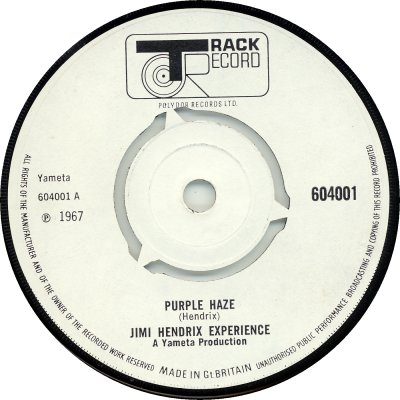
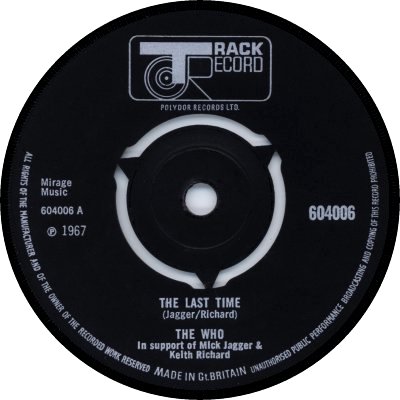
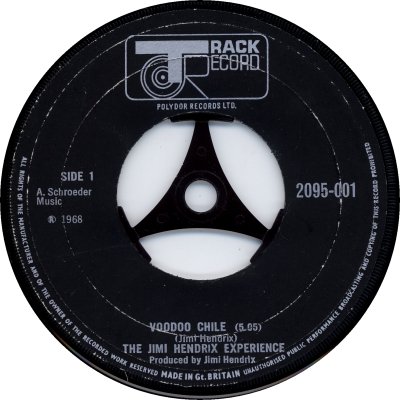
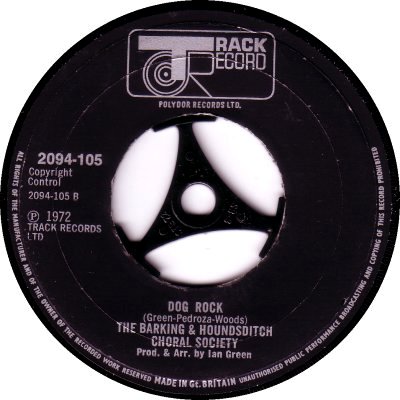
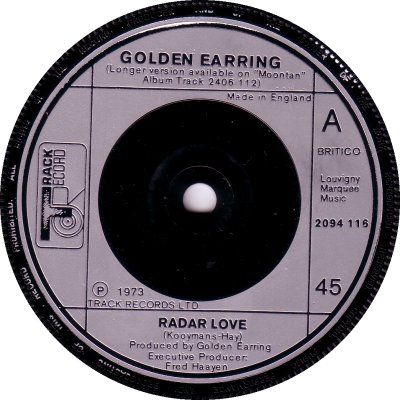
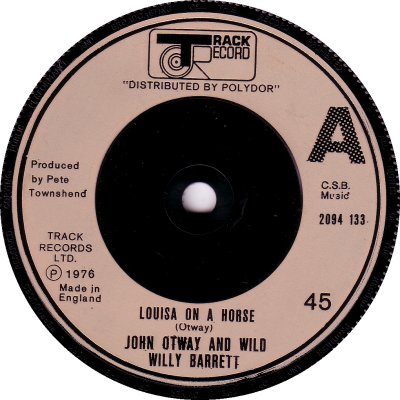
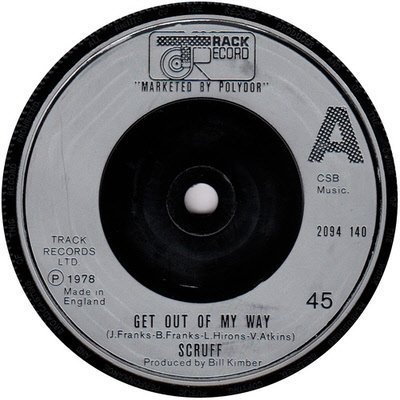
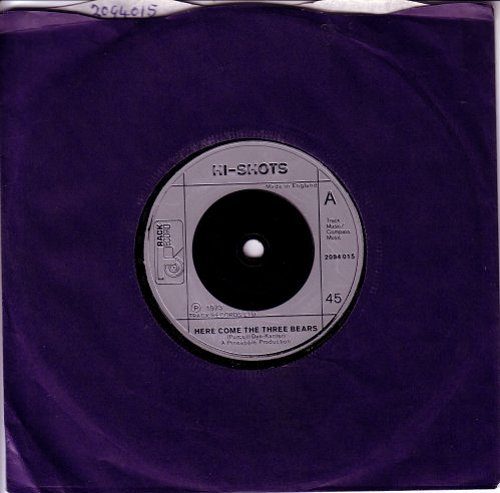
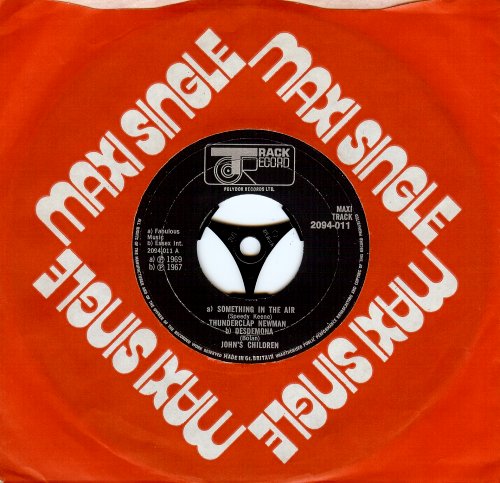
A prominent independent company. Track was founded in 1966 by Kit Lambert and Chris Stamp, with Pete Kameron. Lambert and Stamp had taken over management of The Who in 1964 and had helped to direct and shape the band. Initially they had put them into the hands of producer Shel Talmy, which resulted in their early records coming out on Brunswick in the UK - Talmy had licensed the masters to American Decca, whose outlet in this country was Brunswick. A short spell with Robert Stigwood's 'Reaction' label followed, and then, with The Who's popularity proven, Lambert and Stamp were able to gain financial backing from Polydor for their own label, which would of course feature the band. In the beginning the new label was apparently known as Track Record Records, but unsurprisingly this was generally shortened to Track. Before Track could get off the ground the pair made another signing, one which was to prove very significant: they snapped up a then-unknown American singer / guitarist, Jimi Hendrix. The first single by The Jimi Hendrix Experience, 'Hey Joe' b/w 'Stone Free', was intended to be Track's first release, but, presumably because of a combination of operational reasons and a desire to get the single on the market as quickly as possible, it came out on Polydor (56139) in December 1966. It got into the Charts, and only just failed to make the Top 5. As a result it was Hendrix's follow-up single, Purple Haze' b/w '51st Anniversary' (604001; 3/67), which had the honour of launching Track, the following March.
'Billboard' of the 18th of February 1967 noted that Track was on its way: it mentioned it as one of two new labels that Polydor was bringing out, the other being Camp, the label of publishers Campbell Connolly. According to 'BB', Polydor had become popular because of its 'open door' policy of allowing publishers, artists and independent producers who had 'hit catalogue potential' to launch their own labels under Polydor's sponsorship. According to the article, Track was to feature other UK artists as well as The Who. 'Record Retailer' gave Track a mention in its issue of the 16th of March, saying that it was to make its debut that week with 'Purple Haze', through Polydor. Track hit the ground running: 'Purple Haze' reached No.3 in the Charts, and the label's second single, 'Pictures Of Lily' b/w 'Doctor, Doctor' by The Who (604002; 4/67), almost equalled that, stalling at No.4. A press release, put out between the two singles, suggested that the new company had big ideas: it said that the members of The Who were to be involved in choosing Track's releases, with Roger Daltrey looking after the Soul and R&B records, and Keith Moon handling Surf and 'Good Time' ones. Pete Townshend was to look after Jazz and 'New Sound' material, leaving 'Orchestral' items to John Entwistle. Kit Lambert was said to be in charge of Track's Classical department. The lack of Track records in the latter six categories suggests that the release may have been less than totally serious, but Track did make some attempts to break into the R&B market, with or without Daltrey's involvement.
'BB' of the 30th of September gave some details of Track's R&B ambitions. It reported that Lambert was in America looking to forge ties with small R&B labels in order to give them a corporate identity in the UK and to help Track to compete with Atlantic and Motown. He had already signed a deal with the Solid Hit Band combine, as a result of which a single by The Parliaments was scheduled for release in around three weeks' time and other product on Revilot, Groovesville and Solid Hit itself was available to Track. In addition Nancy Lewis, American-born public relations officer for Track Records and for Lambert and Stamp's New Action management company, had been sent from London to New York so that she could scout R&B groups and set up an American office. In the event, Lambert's stated aim 'to found a 'third force' in the UK's R&B field' wasn't realised, but Track did put out a handful of American R&B singles: records by The Parliaments, The Sand Pebbles and Al Kent in the final two months of 1967, and one by The Deboniares at the start of 1970. The Sand Pebbles single, 'Love Power' b/w 'Because Of Love' was issued twice: as 604015 in December 1967, and as 604028 in March 1969. Lewis left Track for a while but returned in 1969 for a stint as general manager of the company's American operation.
Track had ambitions beyond making records. Both Lambert and Stamp had a background in films, which was how they first encountered The Who, and they made moves in that direction. 'BB' of the 5th of October 1968 reported that they were setting up an hour-long pilot TV show for a proposed Pop Music series, which was to be aimed at the joint American and UK markets. Nancy Lewis was quoted as saying that its target audience would be 'The young, hip adult', that it would be 'fast paced' and that it wouldn't have a host. Nothing much seems to have come of that venture. Two months later, 'BB' of the 5th of October revealed that Track intended to establish an independent promotion operation in the States; it was expected to be up and running by the start of the New Year, and a distribution deal had been signed with Atlantic. The deal must have been satisfactory, for it renewed in 1969 ('BB', 2nd August). Towards the end of 1970, 'BB' of the 19th of December broke the news that The Who were to make a film of their Rock Opera 'Tommy'. The intention was for it to be produced by the film production wing of Track Music, and co-owners of the company Stamp, Lambert and Kameron were to head the production team. The film was eventually made, but a start on it wasn't made until 1974, under director Ken Russell, and The Who had moved on from Track by that point - the soundtrack album came out on Polydor.
Alongside the alternative projects, Track continued releasing records. It had a fairly small roster of artists but it enjoyed Singles Chart success with several of them during the late '60s and early '70s. Jimi Hendrix provided six more hits, though his only No.1 was a posthumous maxi-single featuring 'Voodoo Chile', 'Hey Joe' and 'All Along The Watchtower' (2095-001; 10/70). The Who were Track's most consistent hit-makers, providing thirteen in total from 1967 to 1973, five of them getting into the Top Ten. Oddly, the company's only other No.1 singles came from bands which were more or less one-hit wonders: The Crazy World Of Arthur Brown hit the top spot in the summer of 1968 with 'Fire!' b/w 'Rest Cure' (604022; 6/68), and Thunderclap Newman did the same a year later with 'Something In The Air' b/w 'Wilhelmina' (604031; 5/69). Several singles by John's Children, a group featuring future megastar Marc Bolan, were released but failed to make an impression.
Track didn't get many mentions in the music press in 1970, apart from those surrounding Jimi Hendrix's death in October. 'BB' of the 30th of that month observed that Patti Labelle & The Bluebelles had signed with the company and claimed that their records would be released on the Fly label here, through Track. The reporter must have been misled, as the only two tracks from the group's various sessions to be released here came out on Track some five-and-a-half years later. The sessions did however result in three singles and a couple of albums which came out on the Warner Bros. label in America. The only other article to mention the company said that The Who were preparing a four-track 'mini LP', to be released early in 1971. That record was never released, but the tracks from it appear to have eventually surfaced on either the 'Who's Next' or 'Odds And Sods' LPs. The next few years saw Track involved in a couple of legal battles. First, in 1972, Marc Bolan, who was by that time famous, took High Court action to restrain Track and Polydor from releasing any of the material that he had recorded while he was with the company ('BB', 8/7/72), which resulted in a maxi-single and an album being shelved. Some kind of agreement must eventually have been reached, as they were issued a couple of years later. Then in 1973 Track, Polydor and the estates of Jimi Hendrix and of Michael Jeffrey (Hendrix's recently deceased manager) became involved in a long legal tussle with American company PPX Enterprises, for whom Hendrix had recorded prior to his move to England. PPX claimed that Hendrix had signed a three-year contract with them which was still in force when he made his first recordings for Track. PPX lost their main case and had to pay costs to the defendants, but their ownership of the masters that Hendrix had recorded for them was confirmed, which put those recordings out of Track's reach.
Track ran out of impetus in the early '70s, for a variety of reasons. Hendrix's death at the start of the decade was a bad blow, and in 1973, as the result of a deal signed with Polydor in late 1972, the company had to delete all of his records. 'BB' of the 31st of March, reporting on the deletion, said that the masters had always been owned by Polydor, but that, following the formation of Track as a joint venture between Stamp, Lambert and Polydor, it had been agreed that they would come out on the new label. The agreement had had a time limit set to it and had recently expired, leaving Polydor free to reissue the Hendrix tracks itself. Some relief came in the form of Roger Daltrey's 'Giving It All Away' b/w 'The Way Of The World' (2094-110; 3/73) and Golden Earring's 'Radar Love' b/w 'Just Like Vince Taylor' (2094-116; 11/73), which supplied Track with a couple of Top Ten entries, but an even worse blow than the loss of Hendrix came in 1974, when a deterioration in the relationship between Lambert, Stamp and The Who led to the band departing for Polydor and finding new management. Only three singles were released on the label in 1974-75, all by Golden Earring and all unsuccessful; there was also an album by the band, and a compilation of Who tracks. Three more singles followed in 1976, by Labelle, Roy Martin, and John Otway & Wild Willy Barrett, but none of them troubled the Chart compilers. In that same year Stamp and Lambert relocated to New York and concentrated their efforts on the company's American arm.
There were signs of improvement in 1977. 'Music Week' of the 9th of April was able to announce that, 'after years of relative inactivity', Track was to be revived under new managing director Mafalda Hall, who had previously been Arista's director of international operations. Daniel Secunda was to remain with the company and look after artist management and development. The article noted that Lambert and Stamp's interests had diversified over the past few years, and said that they had only taken the decision to revive the label late the previous year. 'BB' of the 23rd of April provided the information that Shakin' Stevens had been signed to Track, along with Punk bands Johnny Thunders & The Heartbreakers and Siouxsie & The Banshees (as it transpired Siouxsie and the band did make some demos for Track but ended up signing to Polydor). There were also plans to sign a Pop band and a girl singer. It was the intention to have a marketing manager in place by the end of April and a promotions manager some time in May. Hall was quoted as saying that she would like both posts to be filled by women because she thought that women had better egos. She also said that she wanted her team to stay small in order to avoid the dissipation of effort that comes with a bigger team.
In its revived form Track put out half a dozen singles between May 1977 and February 1978, including a couple each by Stevens and The Heartbreakers. Sadly, around the latter point it ran into terminal financial difficulties. 'Music Week' of the 18th of March reported that a single by The Heartbreakers, 'It's Not Enough' b/w 'Let's Go' (2094-142), scheduled for release that Friday, had been withdrawn, and that the company had gone into liquidation, owing £70,000. Some copies of that single were sent out as promos, and they are now very sought-after. That was the end of the original Track, but it was revived in 2012 by Ian Grant and Bill Kenwright, with the blessing of Chris Stamp - Kit Lambert had died in 1981.
One basic label design served Track throughout. Early pressings of the first single had white labels with black printing (1), but for later pressings and subsequent singles the colour scheme changed to silver-on-black. Manufacture was by Polydor / Phonodisc, which resulted in singles having either solid centres, three perforations (2), or large spindle holes and plastic 'spiders' (3). From the middle of 1973 injection moulded labels were used, as was the case for all the Polydor family singles. Issues up to and including 2094-131 were coloured silver; they had lines on the labels and the logo on the left, at 90 degrees (5). For subsequent issues the colour changed to fawn, the logo moved back to the top, and the lines disappeared (6); the silver colour made a return for the final three singles. For some reason the usual text 'Distributed by Polydor' under the logo was replaced by 'Marketed by Polydor' for 2094-140, 'Get Out Of My Way' b/w 'Rock 'n' Roll Woman' by Scruff (7) - thanks to James Denholm for pointing out that variant and for providing the scan. From 1973 onwards, Track singles often came in an unmarked navy-blue sleeve (8); the Various Artists EP 2094-011 had its own 'Maxi Single' sleeve, which is shown here by courtesy of Robert Bowes (9).
It's not altogether clear what the relationship between Track and Polydor was, but as Polydor put up at least some of the money to start the label off it must have been a close one. 'RR' of the 23rd of December 1972 said that the two had signed a new three-year pressing and distribution deal, which leaves open the possibility that the previous deal had been different; while later in the decade the 'BB' article from the 23rd of April 1977 described Track as one of Polydor's licensed labels. With regard to catalogue numbers, there were three main series for singles. From 1967-70 they were numbered in the 604000s, but in the Spring of 1970, when Polydor adopted a 'seven numbers starting with 2' policy for all their labels, this was replaced by a 2094-000 series. Interspersed with the 2094-000s for some reason there were a couple of 2095-000s, while the sole 2252-000 was a four-track EP. Thunderclap Newman's 'Wild Country' b/w 'Hollywood' can be found with two different numbers, 2095-002 and 2094-005, the latter being from November 1970. In June 1972 the main series became 2094-100, but the occasional 2094-000 surfaced after that point. Thanks to Nicholas Hough for the first scan. The discography below only covers the 1970s.
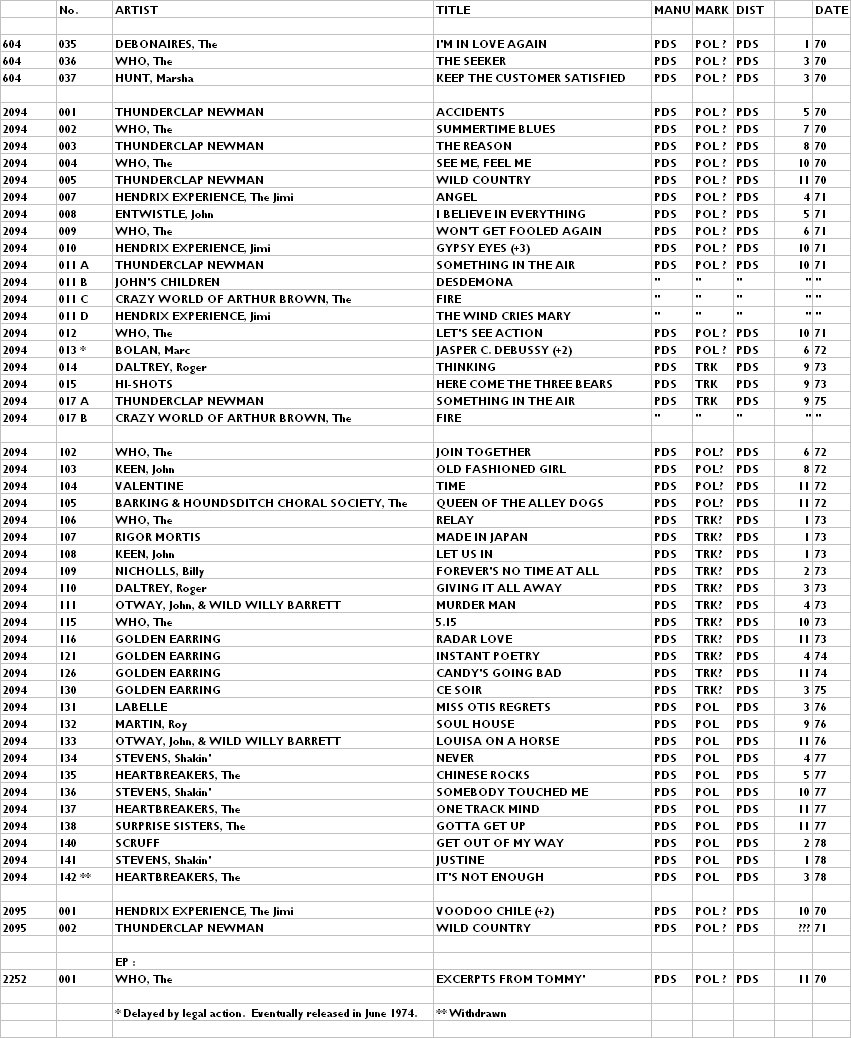


Copyright 2006 Robert Lyons.

